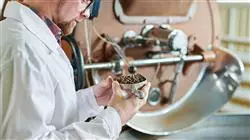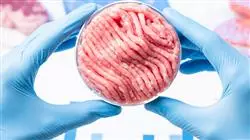University certificate
The world's largest faculty of nutrition”
Introduction to the Program
Do not hesitate, the food industry needs qualified nutritionists like you to manage the processes that regulate the food we consume”

The Postgraduate diploma in Process Management and Validation in the Food Sector at TECH Global University is aimed at the comprehensive management of animal food safety.
Specifically, this training program develops the most important concepts of hazard, risk and safety as applied to the food industry, as well as the most commonly used methods to control them, including allergens. It addresses the principles of safety assurance management in the food production industry, using the HACCP plan as a model, its prerequisites, the stages for its implementation and the verification of its efficiency. Similarly, the general principles involved in international certification processes are reviewed, covering aspects such as documentation management, electronic records, audits and other requirements to successfully obtain certification.
Another of the strengths of this program is that it reviews the fundamental aspects that ensure critical control points are effectively guaranteeing food safety, as it is fundamental for them to be correctly formulated. In addition, it shows the tools needed to validate the controls in place, verify the effectiveness of these controls and have the confidence to implement sound control processes within the food safety management system.
The teachers of this Postgraduate diploma are university professors and professionals from various disciplines in primary production, the use of analytical and instrumental techniques for quality control, the prevention of accidental and intentional contamination and fraud, regulatory schemes for food safety certification (Food Safety/Food Integrity) and traceability (Food Defence and Food Fraud/Food Authenticity). They are experts in food legislation and regulations on quality and safety, validation of methodologies and processes, digitalization of quality management, new foods research and development and, finally, coordinating and executing R&D&I projects. Essential matters to achieve the competencies required by the sector.
An educational project that is ultimately committed to propel nutritionists to the next level, designed by specialized professionals in each specific area, which adds a transversal quality to the program.
We are what we eat! One of the competencies students will develop on this Postgraduate diploma is how to assess and apply the principle of risk and its analysis in food safety”
This Postgraduate diploma in Process Management and Validation in the Food Sector contains the most complete and up-to-date scientific program on the market. The most important features include:
- Case studies presented by experts in nutrition and food security
- The graphic, schematic, and practical contents with which they are created, provide scientific and practical information on the disciplines that are essential for professional development
- The latest developments in process management and validation in the food industry
- Practical exercises where self-assessment can be used to improve learning
- Its special emphasis on innovative methodologies in process management and validation in the food sector
- Theoretical lessons, questions to the expert, debate forums on controversial topics, and individual reflection assignments
- Content that is accessible from any fixed or portable device with an Internet connection
Invest in this program and you will expand your capabilities as a 21st century nutritionist”
It includes in its teaching staff professionals who belong to the food sector and who focus on process management and validation before food finally reaches the consumer. This ensures correct monitoring of the food chain, a process that nutritionists play an important role in.
The multimedia content, developed with the latest educational technology, will provide the professional with situated and contextual learning, i.e., a simulated environment that will provide immersive specialization programmed to learn in real situations.
This program is designed around Problem-Based Learning, whereby the professional must try to solve the different professional practice situations that arise throughout the program. For this, the professional will be assisted by an innovative interactive video system developed by recognized experts in Process Management and Validation in the Food Sector and with great experience.
Learn to manage and validate processes in the food sector while remaining professionally active thanks to this online TECH Postgraduate diploma"

The best teaching material at your fingertips + the latest educational technology = a future full of potential"
Syllabus
The program is designed and structured according to requirements in the food sector, which guarantees nutritionists quality content updated by experts in the field, who face process management on a daily basis. The curriculum is thus organized in three modules that offer future graduate a complete vision, starting from how food safety is managed and delving into safety certifications, continuing through the validation of new methodologies and processes, such as self control systems or audits. All this to ensure a control that assesses and monitors the processes to which all types of food are subjected before reaching the consumer.

It is part of the chain that manages and validates the processes food is subjected to before reaching the end consumer”
Module 1. Food Safety Management
1.1. Food Safety Principles and Management
1.1.1. The Concept of Danger
1.1.2. The Concept of Risk
1.1.3. Risk Evaluation
1.1.4. Food Safety and Its Management Based on Risk Assessment
1.2. Physical Hazards
1.2.1. Concepts and Considerations on Physical Hazards in Foods
1.2.2. Physical Hazard Control Methods
1.3. Chemical Hazards
1.3.1. Concepts and Considerations on Chemical Hazards in Foods
1.3.2. Chemical Hazards Naturally Occurring in Food
1.3.3. Hazards Associated with Chemicals Intentionally Added to Foods
1.3.4. Incidentally or Unintentionally Added Chemical Hazards
1.3.5. Chemical Hazard Control Methods
1.3.6. Allergens in Food
1.3.7. Allergen Control in the Food Industry
1.4. Biological Hazards
1.4.1. Concepts and Considerations of Biological Hazards in Foods
1.4.2. Microbial Hazards
1.4.3. Non-Microbial Biological Hazards
1.4.4. Biological Hazard Control Methods
1.5. Good Manufacturing Practices Program (GMP)
1.5.1. Good Manufacturing Practices (GMP)
1.5.2. Background on GMP
1.5.3. Scope of GMPAl
1.5.4. GMPs in a Safety Management System
1.6. Standard Operating Procedure for Sanitation (SSOP)
1.6.1. Sanitary Systems in the Food Industry
1.6.2. Scope of SSOPs
1.6.3. Structure of a SSOP
1.6.4. SSOPs in a Safety Management System
1.7. The Hazard Analysis and Critical Control Point (HACCP) Plan
1.7.1. Hazard Analysis and Critical Control Points (HACCP)
1.7.2. Background of HACCP
1.7.3. HACCP Prerequisites
1.7.4. The 5 Preliminary Steps to HACCP Implementation
1.8. The 7 Steps of Hazard and Critical Control Point (HACCP) Plan Implementation
1.8.1. Risk Analysis
1.8.2. Identification of Critical Control Points
1.8.3. Establishment of Critical Limits
1.8.4. Establishment of Monitoring Procedures
1.8.5. Implementation of Corrective Actions
1.8.6. Establishment of Verification Procedures
1.8.7. Record Keeping and Documentation System
1.9. Evaluation of the Efficiency of the Hazard and Critical Control Point Plan (HACCP) System
1.9.1. Evaluation of the Efficiency of a CCP
1.9.2. Overall Evaluation of the Efficiency of the HACCP Plan
1.9.3. Use and Management of Records to Evaluate the Efficiency of the HACCP Plan
1.10. Hazard Analysis and Critical Control Points (HACCP) Plan System Variants Based on Risk Systems
1.10.1. VACCP or Vulnerability Assessment and Critical Control Points (VACCP) Plan
1.10.2. Threat Assessment Critical Control Points (TACCP)
1.10.3. Hazard Analysis and Risk-Based Preventive Controls (HARPC)
Module 2. Food Safety Certifications for the Food Industry
2.1. Principles of Certification
2.1.1. The Certification Concept
2.1.2. The Certifying Agencies
2.1.3. General Outline of a Certification Process
2.1.4. Management of a Certification and Re-certification Program
2.1.5. Management System before and after Certification
2.2. Good Practice Certifications
2.2.1. Good Manufacturing Practice (GMP) Certification
2.2.2. The Case of GMP for Food Supplements
2.2.3. Good Practice Certification for Primary Production
2.2.4. Other Good Practice Programs (GxP)
2.3. ISO 17025 Certification
2.3.1. The ISO Standards Scheme
2.3.2. ISO 17025 System Overview
2.3.3. ISO 17025 Certification
2.3.4. The Role of ISO 17025 Certification in Food Safety Management
2.4. ISO 22000 Certification
2.4.1. Medical history
2.4.2. Structure of the ISO 22000 Standard
2.4.3. Scope of ISO 22000 Certification
2.5. GFSI Initiative and the Global GAP and Global Markets Program
2.5.1. The GFSI (Global Food Safety Initiative) Global Food Safety System
2.5.2. Global GAP Program Structure
2.5.3. Scope of Global GAP Certification
2.5.4. Structure of the Global Markets Program
2.5.5. Scope of the Global Markets Program Certification
2.5.6. Relation between Global GAP and Global Markets with Other Certifications
2.6. SQF Certification (Safe Quality Food)
2.6.1. SQF Program Structure
2.6.2. Scope of SQF Certification
2.6.3. Relationship of SQF With Other Certifications
2.7. BRC Certification (British Retail Consortium)
2.7.1. BRC Program Structure
2.7.2. Scope of BRC Certification
2.7.3. Relationship of BRC With Other Certifications
2.8. IFS Certification
2.8.1. IFS Program Structure
2.8.2. Scope of IFS Certification
2.8.3. Relationship of IFS With Other Certifications
2.9. Food Safety System Certification 22000 (FSSC 22000)
2.9.1. Background of the FSSC 22000 Program
2.9.2. FSSC 22000 Program Structure
2.9.3. Scope of FSSC 22000 Certification
2.10. Food Defence Programs
2.10.1. The Concept of Food Defence
2.10.2. Scope of a Food Defence Program
2.10.3. Tools and Programs for Implementing a Food Defence Program
Module 3. Validation of New Methodologies and Processes
3.1. Critical Control Points
3.1.1. Significant Hazards
3.1.2. Prerequisite Programs
3.1.3. Critical Control Point Management Chart
3.2. Verification of a Self Control System
3.2.1. Internal Audits
3.2.2. Review of Historical Records and Trends
3.2.3. Customer Complaints
3.2.4. Detection of Internal Incidents
3.3. Monitoring, Validation and Verification of Control Points
3.3.1. Surveillance or Monitoring Techniques
3.3.2. Validation of Controls
3.3.3. Efficiency Verification
3.4. Validation of Processes and Methods
3.4.1. Documentary Support
3.4.2. Validation of Analytical Techniques
3.4.3. Validation Sampling Plan
3.4.4. Method Bias and Accuracy
3.4.5. Determining Uncertainty
3.5. Validation Methods
3.5.1. Method Validation Stages
3.5.2. Types of Validation Processes, Approaches
3.5.3. Validation Reports, Summary of Data Obtained
3.6. Incident and Deviation Management
3.6.1. Formation of the Work Team
3.6.2. Description of the Problem
3.6.3. Root Cause Determination
3.6.4. Corrective and Preventive Actions
3.6.5. Efficiency Verification
3.7. Root Cause Analysis and Its Methods
3.7.1. Causal Analysis: Qualitative Methods
3.7.1.1. Tree Causes Root
3.7.1.2. Why
3.7.1.3. Causes and Effect
3.7.1.4. Ishikawa Diagram
3.7.2. Cause Analysis: Quantitative Methods
3.7.2.1. Data Collection Data Model
3.7.2.2. Pareto Chart
3.7.2.3. Scatter Plots
3.7.2.4. Histograms
3.8. Claims Management
3.8.1. Claim Data Collection
3.8.2. Investigation and Action
3.8.3. Preparation of Technical Report
3.8.4. Claims Trend Analysis
3.9. Internal Audits of the Self-Control System
3.9.1. Competent Auditors
3.9.2. Audit Program and Plan
3.9.3. Scope of the Audit
3.9.4. Reference Documents
3.10. Executing Internal Audits
3.10.1. Opening Meeting
3.10.2. System Evaluation
3.10.3. Deviations from Internal Audits
3.10.4. Closing Meeting
3.10.5. Evaluation and Monitoring of the Effectiveness of Deviation Closure

A unique, key, and decisive educational experience to boost your professional development”
Postgraduate Diploma in Management and Validation of Processes in the Food Sector
If you are a nutritionist and want to specialize in the management and validation of processes in the food sector, the Postgraduate Diploma in Process Management and Validation in the Food Sector is the perfect option for you. This TECH program provides you with the necessary tools to carry out process management and validation in an effective and up-to-date manner.The work of process management and validation is fundamental in the food industry, especially with regard to the animal products we consume. That is why the continued presence of degreed specialists is required to ensure food quality and safety. The curriculum of this program focuses on the fundamental aspects that ensure the effectiveness and thoroughness of critical control points. The necessary tools are applied to validate the implemented controls, verifying their effectiveness and, consequently, to be able to implement solid control processes within the food safety management system.
A specialization in high demand
With this Postgraduate Certificate, you will be able to deepen in the management and validation of processes in the food sector, from the perspective of nutrition. In addition, you will learn the latest techniques and tools for quality control and monitoring in the food industry. The program is designed and led by experts in the field, who will provide you with a high quality update in the management and validation of processes in the food industry. At the end of the Postgraduate Certificate, you will be able to design and implement food safety management programs, ensuring the quality and safety of animal products consumed.







